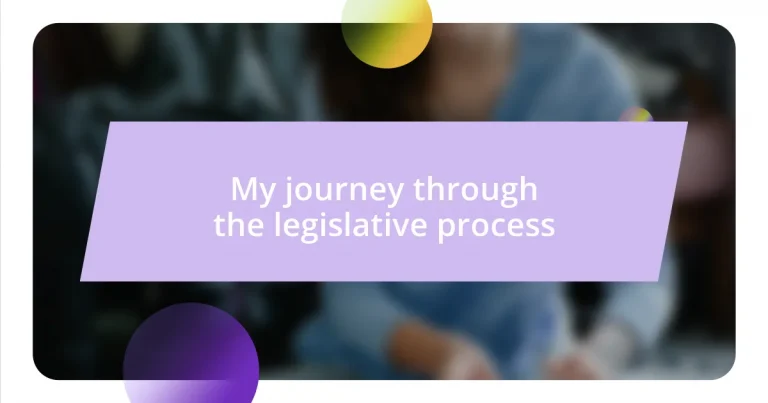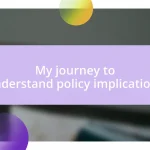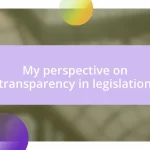Key takeaways:
- My initial fascination with legislation was sparked in high school through firsthand experiences with lawmakers, leading to deeper community engagement.
- Building relationships with stakeholders is crucial; genuine conversations can bridge gaps and foster collaborative solutions for effective policy-making.
- Evaluating legislative outcomes is essential for understanding effectiveness and ensuring future laws genuinely benefit the community, emphasizing the need for ongoing dialogue.
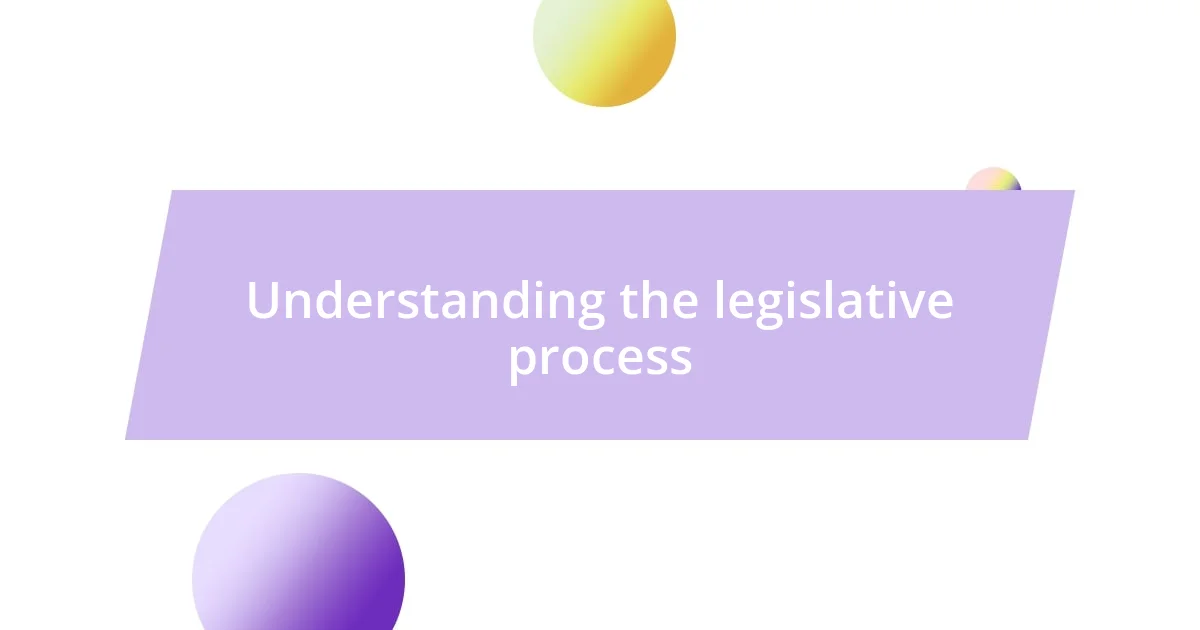
Understanding the legislative process
Understanding the legislative process can feel like stepping into a labyrinth. I’ve often found myself pondering, how do laws actually come to be? This intricate journey begins with an idea, shaped and refined by the aspirations and needs of citizens, which is something I find deeply compelling.
As I navigated this process, I was reminded of my first experience attending a committee meeting. The energy in the room was palpable as passionate advocates shared their perspectives. It struck me just how vital these discussions are, turning abstract ideas into tangible proposals that can eventually lead to real change in our communities.
One thing that surprised me is the immense power of public opinion. I remember a heated debate where community voices shifted the tide in favor of a bill. Engaging with constituents not only influences lawmakers but also fosters a sense of ownership over our democracy. Who would’ve thought that our voices could truly shape the legislative landscape?
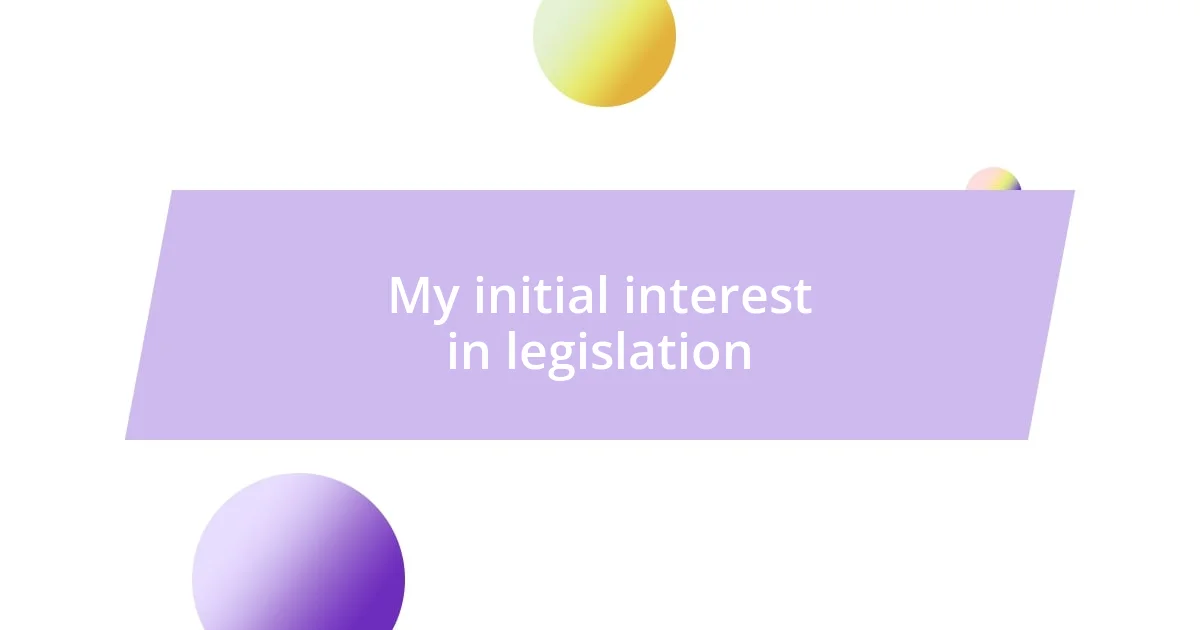
My initial interest in legislation
I have always been fascinated by the role legislation plays in shaping our society. My initial interest sparked during a high school civics class when our teacher invited a local legislator to speak. Hearing firsthand how laws are crafted and debated was exhilarating; it felt like a window opened to a world where ideas could actually make a difference. That experience drove me to seek out opportunities to learn more, fueled by the excitement of potentially influencing our community’s future.
There were a few key moments that really crystallized my enthusiasm:
- School projects on local issues: I remember diving deep into topics that mattered to my community, which opened my eyes to the complexities of governance.
- Volunteering for campaigns: I quickly discovered the energy and commitment required to bring about change, which solidified my belief in active participation.
- Attending town hall meetings: These gatherings were enlightening; witnessing citizen engagement reinforced the idea that every voice mattered, including my own.
Each of these experiences laid the groundwork for my journey into understanding how legislation can truly impact lives. The more I learned, the more I wanted to advocate for change.
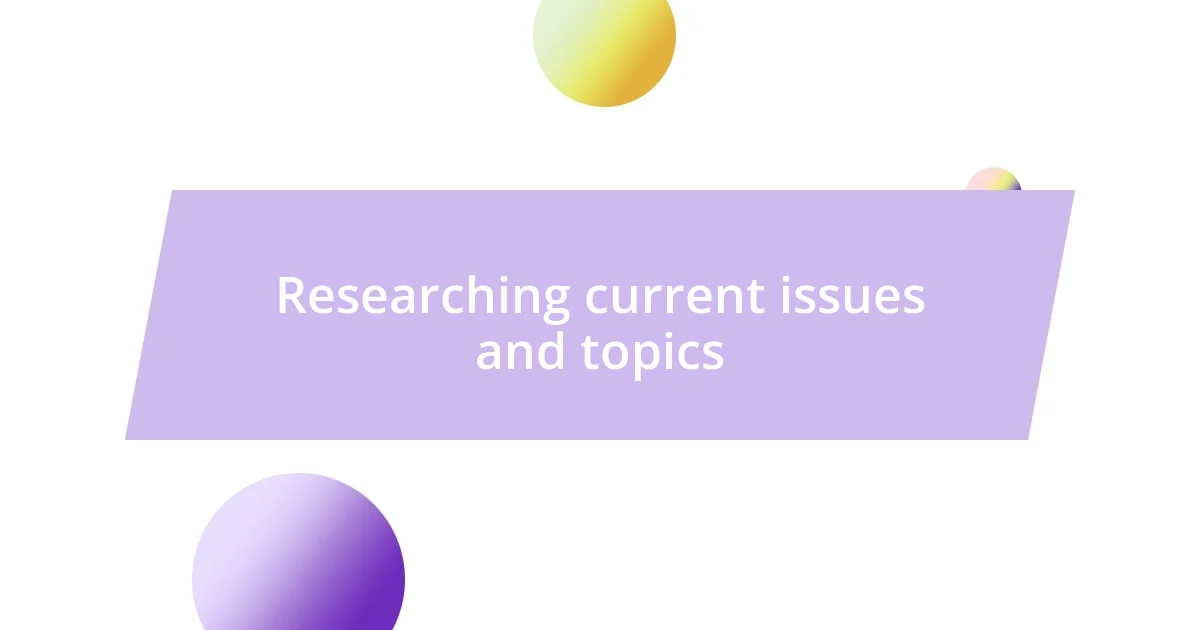
Researching current issues and topics
Researching current issues and topics is an essential step in the legislative process. I remember sifting through various online databases and community boards, seeking the pulse of what mattered most to my fellow citizens. Each article or report unearthed unique perspectives that shaped my understanding of the challenges we faced, illustrating the power of informed advocacy. Isn’t it fascinating how one story can radically shift your viewpoint on an issue?
One time, I joined a local advocacy group that focused on education reform. As we combed through recent studies and data on school funding, I was struck by the stark disparities between neighborhoods. Delving into those numbers wasn’t just research; it became personal. The disparities reflected not only statistics but also the dreams and challenges of real students in my community—something I couldn’t simply overlook. This experience taught me that research isn’t just about facts; it’s about empathy and connections to the people those facts represent.
The landscape of current issues is vast, ranging from healthcare reforms to environmental concerns. I’ve often felt overwhelmed, like a tiny boat in a vast ocean of information. However, I discovered valuable tools like legislative trackers and social media hashtags that helped navigate this sea. These resources clarified complex issues and presented them in an engaging way, transforming a daunting task into an enlightening journey.
| Research Method | Description |
|---|---|
| Online Databases | Access to scholarly articles and reports from trusted sources. |
| Community Boards | Local insights and grassroots opinions on pressing issues. |
| Advocacy Groups | Collaborative discussions and research on specific topics. |
| Legislative Trackers | Real-time monitoring of bills and legislative activities. |
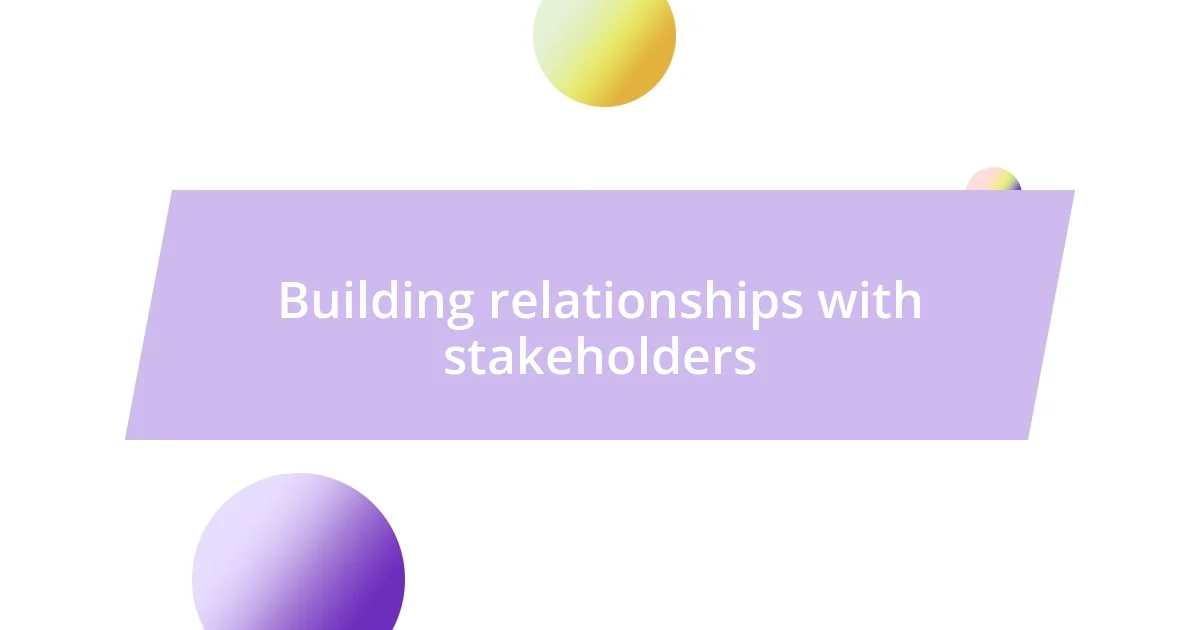
Building relationships with stakeholders
Building relationships with stakeholders is pivotal to navigating the legislative process effectively. During my time volunteering for a community initiative, I vividly remember meeting with local business owners to discuss zoning changes that affected their livelihoods. Approaching them with genuine curiosity about their concerns fostered trust and opened the door for honest dialogue. It made me realize how essential it is to listen first, rather than simply present an agenda.
Collaboration often leads to unexpected but meaningful partnerships. One particularly enlightening experience was attending a joint meeting between environmental activists and city planners. Initially, tensions seemed high, with each party advocating strongly for their viewpoints. However, as the discussion unfolded, I witnessed how shared goals could bridge gaps. Questions like, “How can we protect our environment without hindering development?” encouraged innovative solutions that addressed both sides’ needs. This taught me that understanding diverse perspectives is not just a strategy; it’s a vital part of creating sustainable legislation.
Every encounter with stakeholders deepens my appreciation for the human element in policy-making. I recall a late-night phone call with a housing advocacy group leader who was juggling multiple crises. Their passion for ensuring that everyone has a home reminded me that behind every policy issue are real lives and tales of resilience. As we spoke, we shared not just facts but visions for a better future. I found myself reflecting on a fundamental question: How can we resonate with stakeholders in a way that inspires them to be part of the change? The answer lies in authentic connection and recognition that we are all in this together.
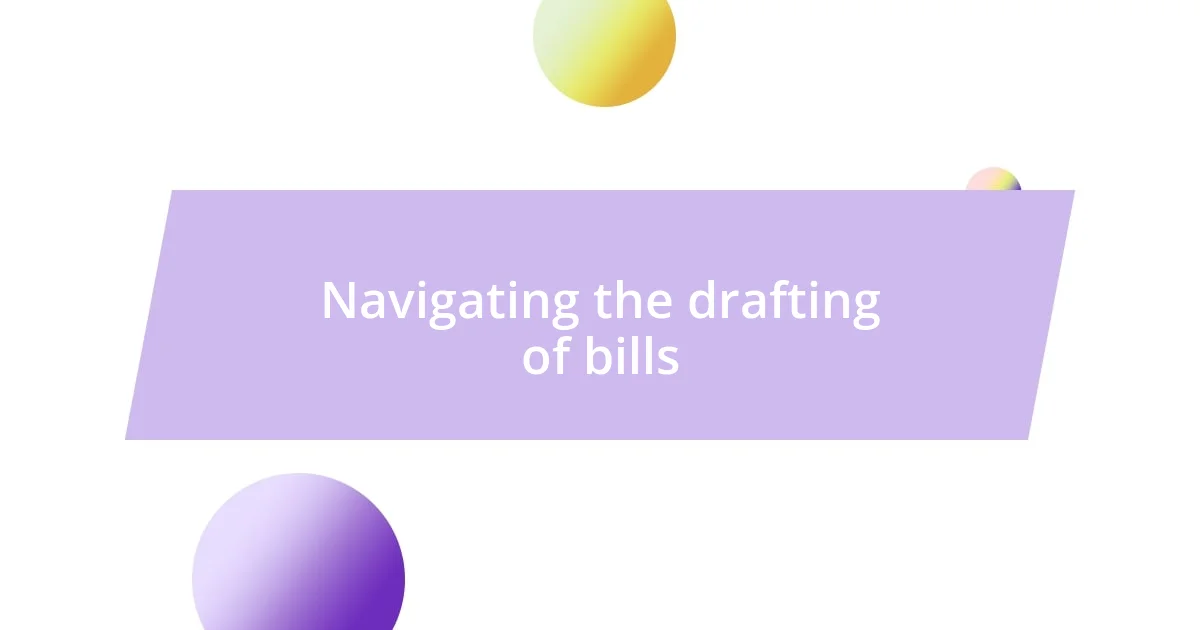
Navigating the drafting of bills
Drafting a bill can feel like threading a needle—challenging but rewarding when done right. I remember my hands shaking when I first put pen to paper, unsure of how to structure my ideas into a coherent proposal. As I learned more about the legislative language and format, I understood how vital it was to be precise and clear. Every word counts; it’s a lesson I wished someone had taught me earlier.
One night, fueled by countless cups of coffee, I found myself unpacking the intricate components of a bill. Frameworks, clauses, amendments—each detail needed careful consideration. It was a moment of clarity when I realized that drafting isn’t just about writing; it’s about weaving in the hopes and needs of the community I aimed to serve. I often asked myself, “How can I ensure that this proposed law will resonate with those affected?” That inquiry kept my focus sharp and my intent genuine.
Moreover, I discovered that drafting is as much about collaboration as it is about individual effort. Working alongside seasoned legislators was enlightening. I recall brainstorming sessions where seasoned insights transformed my initial draft into a comprehensive piece of legislation. Those discussions often felt like a lively dance of ideas, where every input added something valuable. Have you ever experienced a moment where feedback not only improved your work but also deepened your understanding of the topic? I certainly did, and it underscored the importance of community in this legislative journey.
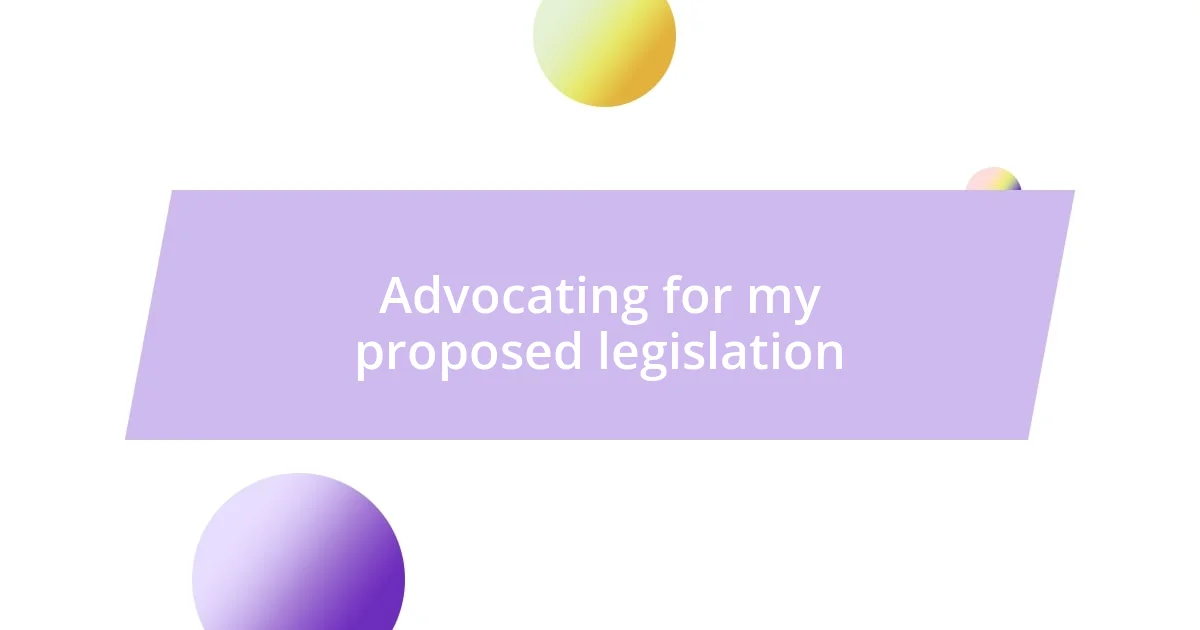
Advocating for my proposed legislation
Advocating for proposed legislation requires a delicate balance of passion and strategy. I vividly recall presenting my proposal to a local council meeting, my heart racing while the council members settled in. The thrill of sharing my vision was accompanied by a stark reality: I needed to connect with their interests and concerns. I posed a question that seemed simple but crucial: “How can this legislation create positive change for our community?” Their engaged responses showed me that advocacy is as much about listening as it is about speaking.
Sharing my journey with those who might benefit from the legislation helped deepen my commitment. There was this moment when I attended a community forum and shared my intent to improve access to healthcare. The look of hope on a single mother’s face as I detailed the proposal left a lasting imprint on my heart. It struck me then: her story was the driving force behind my advocacy. How could I fail to fight for something that meant so much to others? That realization ignited a fire within me to not just argue for my proposal but to ensure it resonated with the lived experiences of the people I was seeking to serve.
Engaging with fellow advocates honed my message and expanded my perspective. I remember a particularly intense brainstorming session with a group of passionate activists. We debated fiercely—sometimes too fiercely—yet, as we explored different viewpoints, it became clear that our shared goal was stronger than our disagreements. Wouldn’t it be more effective to channel that energy into a united front? As we consolidated our ideas, I felt a sense of camaraderie; we transformed individual passions into a collective dream for legislation that truly reflected the community’s voice.
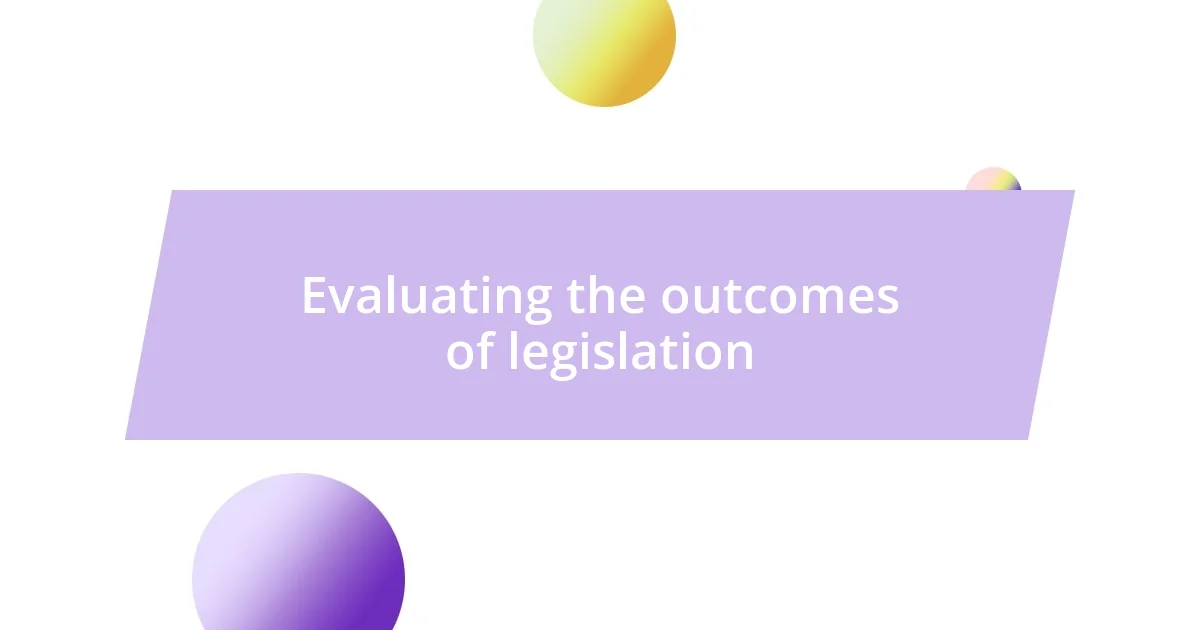
Evaluating the outcomes of legislation
Evaluating the outcomes of legislation is like holding up a mirror to the intent behind the law. I remember the day after one of my proposals was enacted; I found myself at a local community meeting, eager to hear how it was affecting lives. Listening to stories from people whose access to resources had improved was fulfilling—wouldn’t you agree that tangible outcomes make all the effort worthwhile?
However, not every piece of legislation hits the mark. I encountered a scenario where my intended reforms didn’t translate into actual benefits for the community. It was disheartening to hear feedback that some provisions fell short. I’ve learned that gathering data is essential; without it, we risk making decisions based on assumptions rather than reality. How can we ensure future legislation doesn’t repeat past mistakes? This question has become my guiding principle.
I’ve also come to appreciate the importance of ongoing dialogue after a law passes. I once hosted a roundtable with stakeholders to discuss the implications of a newly enacted policy. The contrasts in reactions were eye-opening. What I realized is that legislation is not a one-and-done scenario; it requires adaptation and listening. Isn’t it fascinating how each voice provides a unique perspective, shaping a law’s effectiveness? Engaging in these conversations has reinforced my belief that the legislative process is an evolving journey, not just a destination.












